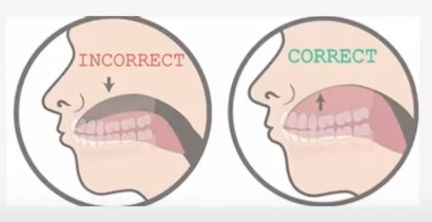Double Up Your Dollars
It has been said that the quickest way to double your money is to fold it in half and put it back in your pocket.
Contentment is the key to plenty. “Those who want to get rich fall into temptation and a snare and many foolish and harmful desires which plunge men into ruin and destruction. ... So if we have enough food and clothing, let us be content” (1 Timothy 6:8-9, cf Proverbs 21:20, 21:5).
Posture Your Tongue for Better (Spiritual) Health
Your tongue is much more than just an instrument for speech or eating, prompting some to ask:
Have you ever thought about how your tongue could be affecting your posture even all the way down to your feet?
What if something as simple as where your tongue rests in your mouth could influence your body’s alignment, balance, and even breathing?
The tongue is more than just a muscle for speaking and eating, it’s deeply connected to the body through fascia, an intricate web of connective tissue that links the tongue to the feet.

It's true. An internet query of a growing body of research reveals that the position of your tongue can influence your posture, balance, breathing, and even facial structure. Here's some of the ways tongue posture can affect your overall health:
POSTURE
- Muscle Tension: Your tongue is connected to muscles in your jaw, neck, and even your shoulders. Poor tongue posture (e.g., pressing against your teeth or lying flat at the bottom of your mouth) can create tension in these areas, leading to misalignment like slouched shoulders or forward head posture.
- Spinal Alignment: When your tongue rests properly — on the roof of your mouth just behind your front teeth — it helps stabilize the head and neck, which supports better spinal posture.
BALANCE
- Proprioception Boost: Proper tongue posture may enhance proprioception — your body's ability to sense its position in space. This can improve balance and stability, especially in people with vestibular disorders.
- Sensory Substitution: The tongue can deliver balance-related signals to the brain, directly affect equilibrium.
BREATHING
- Airway Support: A tongue resting low in the mouth can block the airway, leading to shallow breathing. Proper tongue posture opens the airway, encouraging nasal breathing and better oxygen intake.
FACIAL STRUCTURE
Palate Development: Especially in children and young adults, resting the tongue against the roof of the mouth helps shape the palate and support facial symmetry. Poor posture can lead to a narrower palate and less prominent cheekbones over time.
So, much research has been done, supporting the theory that the tongue is much more key to the body's overall health than previously realized, again prompting some to ask,
"Could improving tongue posture be the missing key to better posture, core strength, and overall movement efficiency?"
*Click here to watch a video on proper tongue posture.
Well, well, well. Perhaps science is lagging a bit behind Scripture when it comes to realizing the immense importance and power of the tongue — well, maybe not physically, but certainly spiritually!
We are told variously throughout the Scriptures of this and so much more:
"So also the tongue is a small member, yet it boasts of great things. How great a forest is set ablaze by such a small fire! And the tongue is a fire, a world of unrighteousness. The tongue is set among our members, staining the whole body, setting on fire the entire course of life, and set on fire by hell. ... But no human being can tame the tongue. It is a restless evil, full of deadly poison" (James 3:5-6,8, ESV).
"Death and life are in the power of the tongue, and those who love it will eat its fruits" (Proverbs 18:21, ESV).
"If anyone thinks he is religious and does not bridle his tongue but deceives his heart, this person's religion is worthless" (James 1:26, ESV).
"A gentle tongue is a tree of life, but perverseness in it breaks the spirit" (Proverbs 15:4, ESV).
Our tongues must take the proper "spritual" posture, or else they can ruin the health of the entire body, and worse, they can be used as a weapon to ruin others! Prompting one to ask ...
"Could improving spiritual tongue posture be the missing key to better health, core strength, and overall spiritual maturity and efficiency?"
Our Children Are a Part of Us
What an amazing piece of art, digital though it may be. In it, the essence and even substance of the child is "made" from the essense and substance of the parent. The one's holes are the other's gain.

[Though it is digital] it is not an AI-generated piece. It was created by Chad Knight, a digital artist known for his surreal and emotionally resonant 3D art … this sculpture is a digital creation and doesn’t exist as a tangible, physical object. It was rendered using 3D modeling software and is meant to be experienced visually on screens rather than in a gallery or museum space.
This grpahic artistry captures beautifully the symbiotic relationship between parent and child. Our children are literally formed out of the matter our own physical being -- the egg, the sperm, the DNA which we contribute. Then as we raise them, we continually, sacrificially give ourselves to them for their growth and welfare. Over time, they are molded and shaped by the fabric of our being, and then reflect, to some measure, the image of our likeness. We are inextricably intertwined.
And yet, as significant as our own symbiotic relationship is with our children, it is infinitely more true of our relationship with God, our Father. We are made in His image. It is He that has made us. In the Person of Jesus, He sacrficed Himself for our own welfare. He is our ultimate model, and we are called to be conformed to His image.
"So God created man in his own image, in the image of God he created him; male and female he created them" (Genesis 1:27, ESV).
"And to put on the new self, created after the likeness of God in true righteousness and holiness" (Ephesians 4:24, ESV).